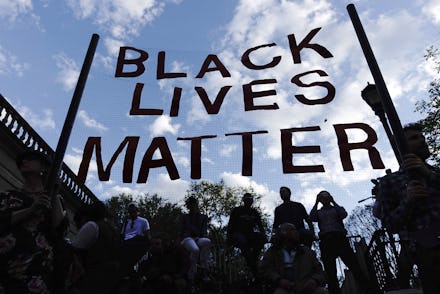Stop peddling the black-on-black crime myth. These DOJ stats prove it’s not a thing.

“What about black-on-black crime?”
That’s been a common refrain of conservative, pro-police activists who believe black social justice movements are too occupied with officer-involved shootings. Some conservatives have argued that Black Lives Matter supporters are willfully ignoring an epidemic of same-race victimizations and killings in places like Chicago and New Orleans.
But those conservatives can stop peddling black-on-black crime rhetoric — even the Justice Department, led by “law and order” proponent Attorney General Jeff Sessions, has debunked it. On Thursday, the DOJ’s Bureau of Justice Statistics released a new crime victimization report revealing that black-on-black violence has declined steadily over more than 20 years.
Between 1994 and 2015, black-on-black violence dropped by 78%, from 66.6 to 14.5 victimizations per 1,000 black persons, according to the BJS’ report, “Race and Hispanic Origin of Victims and Offenders, 2012-15.” The decline happened at a similar rate of decline in white-on-white crimes, the report states.
It’s long been true that the majority of violence victims are victimized by someone of the same race. But 41% of violent victimizations were interracial between 2012 and 2015, according to the BJS.
Here’s more from the report press release:
Among black victims, 63% of violent victimizations were committed by black offenders, 11% by white offenders and 7% by Hispanic offenders.
Among white victims, 57% of victimizations were committed by white offenders, 15% by black offenders and 11% by Hispanic offenders.
Among Hispanic victims, 40% of violent victimizations were committed by Hispanic offenders, 20% by white offenders and 20% by black offenders.
Black-on-black crime rhetoric, however, has served dual purposes for its purveyors. It’s used to discredit civil rights leaders who point to racial disparities in policing and incarceration, while also justifying proposed increases in resources to expand police powers, activists have said. Sessions himself has engaged in dog whistling on the topic — and he did so as recently as Wednesday before the Senate Judiciary Committee.
“The New York City Police Department, which has dedicated itself to proactive community-based policing, saw 334 homicides last year,” Sessions said in his opening statement to committee. “Chicago, while only a third of the size of New York City, logged more than twice as many murders.”
What Sessions and others who share his viewpoint often neglect to mention is the reality that social and economic inequalities are at the root of violence and criminality in all communities, not just majority black ones. Instead, they speak out against people in the BLM movement, as Sessions has, even when activists say they are simply seeking an end to blacks dying disproportionately in police encounters.
Civil rights leaders have said that more police and harsher sentences for offenders, as Sessions has proposed, will not reduce crime and will likely lead to rampant abuse and violations of civil rights.
“This Department is committed to protecting the civil and constitutional rights of all individuals and to prosecuting hate crime violence,” Sessions asserted in his remarks to the Senate Judiciary Committee. “Every American, regardless of race, religion, sex or sexual orientation must be safe from violence and criminality.”
On Wednesday, Vanita Gupta, the president and CEO of the Leadership Conference on Civil and Human Rights, who led the DOJ’s Civil Rights Division during the Obama administration, said Sessions’ rhetoric has not matched his actions on criminal justice.
“Sessions is at the forefront of this administration’s actions to roll back important civil and human rights protections,” Gupta said in a statement. “America needs an Attorney General who will enforce our civil rights laws and protect all people. Until that is the case, Congress must continue to use its significant oversight powers to hold Sessions and the rest of the Trump administration accountable for their harmful and dangerous attacks on civil and human rights.”